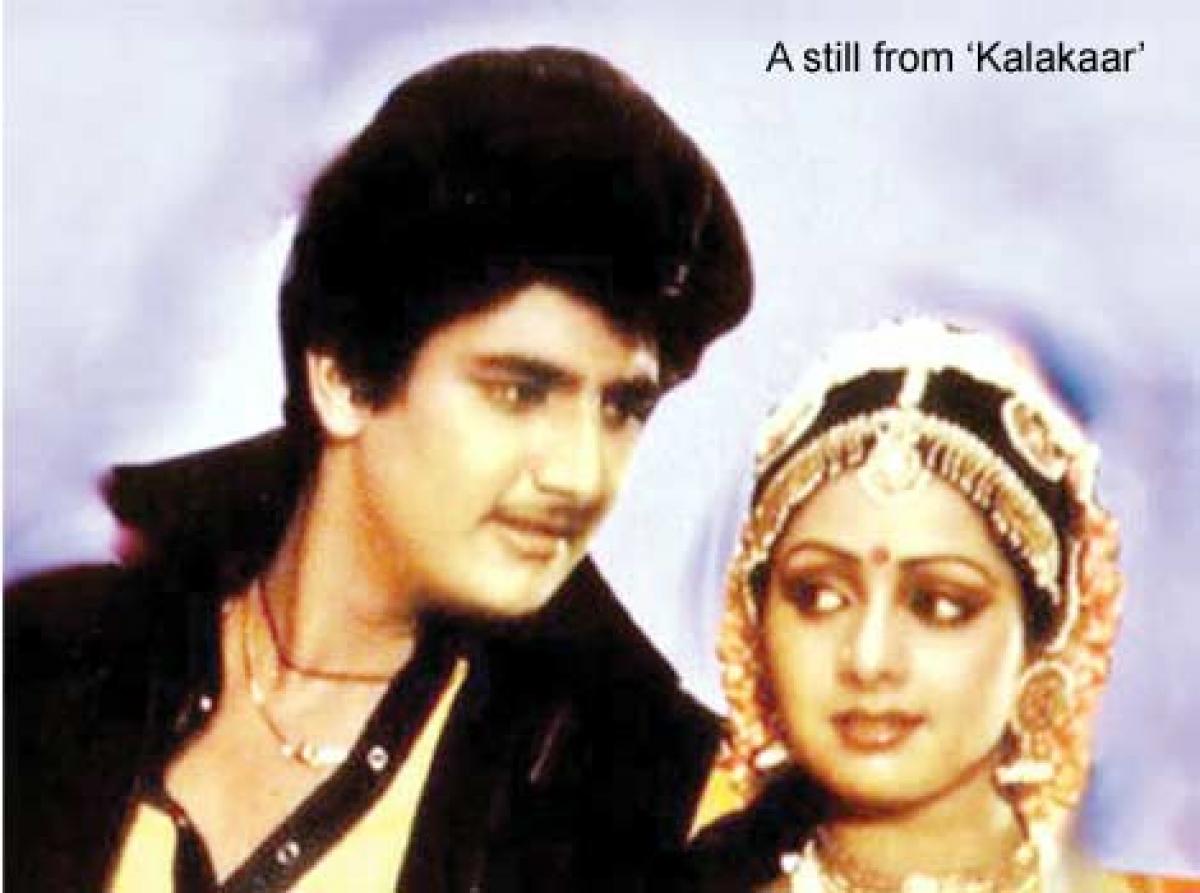Live
- ‘Bachhala Malli’ trailer heightens anticipation
- Karnataka quota row: Backward Class forum chief warns Lingayat seer over 'tinkering with reservations'
- Tight security arrangements at Group-II examination centers District SP
- Alia Bhatt captures attention in white
- Varun Dhawan talks about ‘Baby John’
- ‘Moonwalk’ trailer promises a quirky heist, love, and loyalty
- Combat leaf spot disease
- Ahsaas Channaopens up about her complex character in ‘Mismatched 3’
- Radhika Apte welcomes first child, shares heartfelt post
- Jacqueline dazzles at Da-Bangg Reloaded concert
Just In

x
Highlights
When The Moon Appears On A Blue sky….. If the ‘80s decade is being viewed as a game changer for Indian cinema, it’s not without its reasons. This was the beginning of that phase when the combined might of the four film
Film : Kalakaar (1983)
Singer : Kishore Kumar
Song : Neele Neele Ambar Par
Lyrics : Indeevar
Music : Kalyanji Anandji
If the ‘80s decade is being viewed as a game changer for Indian cinema, it’s not without its reasons. This was the beginning of that phase when the combined might of the four film industries from south India began exporting its notable range of talent to Mumbai, not confining itself to the placement of its heroines like the earlier years.
 On the one hand, if big cine heroes across the Vindhyas like Kamal Hassan and Rajinikanth, followed by Chiranjeevi, Nagarjuna, Venkatesh, Mammotty and Vishnuvardhan wafted into the frames of Hindi cinema so to speak, one music director- Ilaiyarajaa- too was taken note of, for his offbeat notation and composition, a heavy takeoff from the Eastern bloc style of music. By then, Rajaa, yet to become the legendary maestro that he is known as today, was still a household name in Tamil Nadu as also the neighbouring Andhra Pradesh.
On the one hand, if big cine heroes across the Vindhyas like Kamal Hassan and Rajinikanth, followed by Chiranjeevi, Nagarjuna, Venkatesh, Mammotty and Vishnuvardhan wafted into the frames of Hindi cinema so to speak, one music director- Ilaiyarajaa- too was taken note of, for his offbeat notation and composition, a heavy takeoff from the Eastern bloc style of music. By then, Rajaa, yet to become the legendary maestro that he is known as today, was still a household name in Tamil Nadu as also the neighbouring Andhra Pradesh.‘Kalakaar’ (1983), a remake of a blockbuster Tamil hit of 1982, ‘Payanangal Mudivadhillai’, featured Kunal Goswami, (the son of thespian Manoj Kumar) and Sridevi, who had made a grand re-entry into Hindi cinema after her earlier fizzle out. This film, a musical, among others has a stand-out number: “Neele Neele ambar par…” a breezy song sung by the redoubtable Kishore Kumar.
It was a clear acknowledgement of the class of Ilaiyarajaa that it starts on the same note the original also takes off from: the delectable combination of the lead singer and the strumming of the lead guitar. Kalyanji-Anandji, the famed duo, who by then had many golden hits with Kishore Da, whip up another winner with this song, as the base sustains itself strictly on the strong role of the guitar throughout.
Boyish Goswami hams big time in his bid to mime the animated singer that he is supposed to be, while contrived expressions of a baby fat laden Sridevi, barely out of her teens,( as she supposedly loses herself in the composition) are the dominant visuals. None can however come in the way of the booming tone of Kishore as he zippily belts out “Aisa koi saathi ho, aisa koi premi ho, pyaas dil ki bujha jaaye….”
Madhu Malini, the sister/friend role replacement for Farida Jalal in Hindi cinema by then does her overdoing bit, jiving to the pulsating pace while Sridevi is seen confining herself to memorising the lines that the hero bellows out to woo her: “Thande thande jhonke jab baalon ko sehlaye, tapti tapti kirne jab gaalon ko chhoo jaaye….”
The entire sequence is shot on a platform from where the hero faces the heroine’s home, specifically her room on the first floor, which is her world view, so to say. Kunal is relentless in his singing even as his friend, comedian Rakesh Bedi , unable to bear the hunger pangs is seen sprawled out, closing his ears for good effect! The dark night mood is the ambience created and thus no major scope for cinematographic brilliance exists. No chance anyway for the listener not to get swayed by the energetic rendering of Kishore as his high-pitched voice oozes romance. With the high scaled accompaniment of the guitar, his constant companion, Dada hums his way into the last stanza of the song, as the camera takes a top-angle view of the obsessed lover, a nice combination of light and shade.
(This column showcases film songs from Telugu cinema and also numbers of those remade into Hindi from southern languages)
BY K Naresh Kumar

Next Story
More Stories
ADVERTISEMENT
© 2024 Hyderabad Media House Limited/The Hans India. All rights reserved. Powered by hocalwire.com







